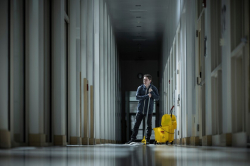Praising essential workers is not just a good thing, it’s critical, BYU study finds
Those who feel unappreciated engage in unhealthy recovery behaviors
PROVO, Utah – Apr 12, 2022 – Remember when all those Twitter and Instagram posts thanking front-line workers blew up after the COVID pandemic hit? Turns out those were a big deal to essential workers.
Unfortunately, not all the essential workers felt the love, and that had major negative impacts.
A new study from BYU, University of Arizona, Rider University and NYU finds essential workers who receive public praise are energized and recover in healthy ways from the stress of their jobs, while those who don’t receive that praise experience negative emotions and are more likely to drink, smoke or overeat to recover from work.
“There are a lot of people that work behind the scenes, and we don’t see them, but they do need our public gratitude,” said study author and BYU Marriott School of Business assistant professor Taeya Howell. “One of the main drivers behind doing the project was to understand what public gratitude does for essential workers while also calling attention to essential workers who are less visible.”
According to the study, published last week in Social Psychological and Personality Sciences, a significant number of essential workers in less visible fields — corrections officers, sanitation workers, truck drivers — felt the public had expressed no gratitude toward them at all. The research included two main studies: a survey of 186 corrections officers in hard-hit New England states during May/June 2020 and a second survey of 376 other essential workers who had seen social media posts praising their work or the work of other essential workers.
Quotes from two essential workers paint a clear picture of the disparity between those receiving the public praise (think nurses, doctors and grocery store workers) and those who did not.
“We’re doing three times the amount of work and feel more unappreciated than before this virus,” said one corrections officer. “Sometimes I question why I’m still an officer.” Contrast that with what one nurse reported in the media as saying: “From the patients, from the families, from management, from random people on the street… They stopped to say ‘Thank you,’ and it just re-energizes you.”
The study found that despite their essentiality, many workers who are less visible to the public received little appreciation for their efforts. For example, a pilot study by the same authors found that only 3% of those surveyed thought of corrections officers when asked to list those considered essential during the pandemic. Said one corrections officer interviewed in the study: “This job is thankless… we believe that people feel that our lives are not as valuable as other first responders.”
However, those who felt seen and appreciated were more likely to engage in healthy activities associated with a positive mental state, like exercising, meditating and spending time outdoors.
Authors say the study demonstrates the importance of public gratitude for essential workers’ long-term health, well-being and, indirectly, for the quality of their work. They also said the findings are also applicable beyond COVID-19, to other future health crises and disaster situations where essential workers do critical work, as well as to routinely stressful events.
“The general public needs to be more cognizant of the fact that showing gratitude to only some essential workers (but not others) can have detrimental effects on those who don’t receive gratitude,” said study author Hee Young Kim, associate professor of management at Rider University.
Fellow study author Sarah Doyle said people should remember that expressions of gratitude are essentially free, and yet they can have a substantial impact on the well-being of essential personnel.
“From an organizational perspective, this is a pretty powerful insight because companies spend a lot of money on other programs or initiatives that are intended to improve well-being of these workers, and yet may not be positively impacting these workers in the same way that felt gratitude does,” said Doyle, assistant professor of management and organizations at the University of Arizona’s Eller College of Management.
Dr. Michael Bizzarro of Penn Medicine Behavioral Health, Nathan Pettit, an associate professor at NYU, and Sijun Kim from the University of Arizona were also co-authors on the study.
Media Contact: Todd Hollingshead, 801-422-8373
Writer: Todd Hollingshead




